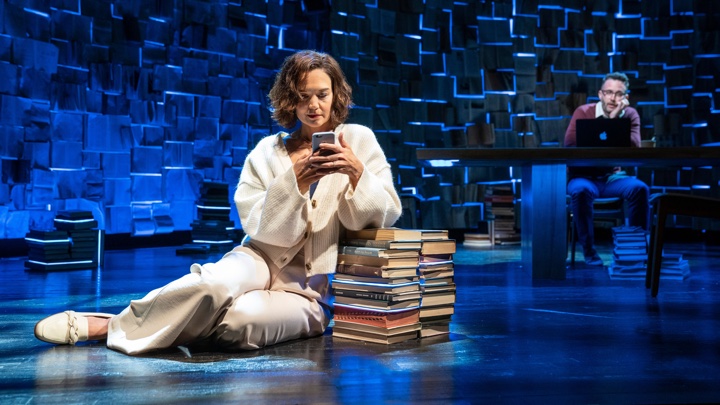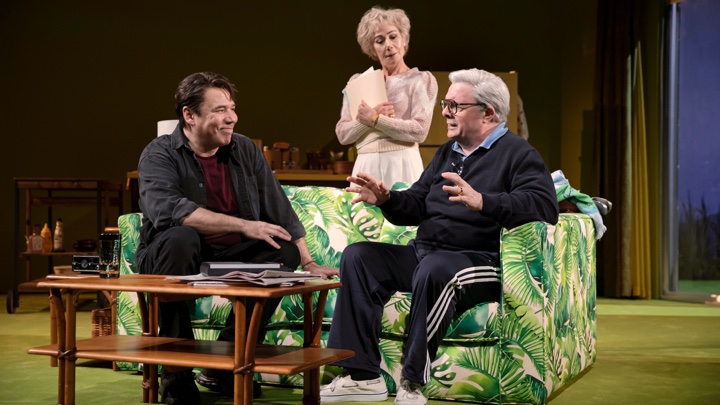

I have little to say about Anna Ziegler’s The Wanderers, which feels like an utterly calculated button-pusher of play. It concerns two Jewish couples who reside Williamsburg, Brooklyn. There are overlapping issues here of a sweeping yet general kind—child rearing, career goals, and most explicitly, the confrontation of religious beliefs in couples who grow in their own directions.
It’s not a spoiler to say that the two pairs will turn out to be connected, and there’s some artistry in the way Ziegler navigates this. Director Barry Edelstein has orchestrated it smoothly, and the scenic design by Marion Williams—basically a mosaic of worn old books—is striking, though it doesn’t really add any dimensionality to the work.
But lack of dimensionality is a bigger problem here than just scenery. I found no character compelling or even minimally interesting; their trials and tribulations are especially tedious. Perhaps that’s why the cast seems almost universally weak (really surprising from the Roundabout, which generally delivers acting at a high level), and in one case not even that—there’s a fidgety, inadequate performance by Katie Holmes, who seems to have been cast because she’s perceived as some kind of star. As seen here, though, she registers merely as a star-in-law.
There’s far more of interest to Pictures from Home. Playwright Sharr White’s theatrical adaptation of Larry Sultan’s book is an ambitious, intriguing idea. It’s also a challenge: Pictures, a memoir whose text is written with considerable style and poignance, is better known for its extraordinary photographs of Sultan’s parents, who are tellingly and problematically situated as the “stars” of his show.
If a picture is worth a thousand words, these images are beyond price, revealing nuances of character in startling, almost lurid color. (Sultan himself was a famous professor of photography, though also very gifted as a prose writer.)
Beyond giving us an almost voyeuristic sense of a very complicated couple, the book also captures a particular way of life—the world of Southern California in the suburban post-war boom of the 1950s and beyond. Though I’m a decade younger than Sultan, who was born in 1946, I, too, am a child of the San Fernando Valley… and of that general Zeitgeist. I think it’s that, more than any religious ties we share (the Sultans are a secularized Jewish family) that piqued my interest in the piece.
But how to adapt book to the very different context of the stage? A design team of heavy hitters (sets by Michael Yeargan, lighting by Jennifer Tipton, projections by Ben Pearcy of 59 Productions) visually address it by splashing illuminated images of many of the photos across the expanse of a stage that evokes Sultan’s rather anonymous suburban home.
As for the script, White shows considerable skill in distilling Sultan’s prose, though for my taste there is far too much framing narrative, most of which is provided by the theatrical doppelganger of Larry himself (played by Danny Burstein). He is one of three characters—the others quite obviously being the parents themselves: Jean and Irving Sultan. Those roles are taken by Zoë Wanamaker and Nathan Lane.
Burstein, Wanamaker, and Lane. These are, of course, exceptionally beloved actors and superbly canny technicians. Individually and collectively, they don’t miss a trick. It would appear also that director Bartlett Sher has encouraged them to mine every beat for maximum effect.
And that’s the problem. My sense of the book is that it’s riddled with sense of somber reality, and perhaps even more, with prickly, even malicious undercurrents. A substantial level of emotional vulnerability as well as cruelty marks almost every encounter and self-revelation. (At the performance I saw, Irving’s question to Larry about whether the limp that now hampers him means he “walks like an old man” prompted the woman sitting next to me to weep for several minutes.
To me, material like this, which lives in the outer edges of emotionality, paradoxically requires great restraint in the playing. Here, we get something quite different. Sher has amped up the initial action for Neil Simon-ish yucks; by contrast, at the play’s end, it’s a sea of mawkishness.
Of the three actors, Wanamaker is the quietly centered, and as a result also the most effective. Burstein, often wonderful in other things, here wears his heart on his sleeve to an almost cringe-worthy degree: it’s nearly impossible to watch his pathetic eagerness for approval.
It’s Lane who generates the biggest ovation, and even before that, one can palpably sense the audience waiting with delight for his trademark tartly sardonic delivery. He does not disappoint, and he has more to offer than that, including some genuinely harrowing and deeply un-funny moments. But the audience’s familiarity with him keeps his performance from fully landing—we can’t not see “Nathan Lane, Adored Comedian” stamped all over it.
There is enough here that Pictures from Home should have an afterlife. I hope in subsequent productions, more attention is paid to the tone, which should be both more delicate, and more corrosive.
Photos: Joan Marcus (Wanderers); Julieta Cervantes (Pictures)


























Comments